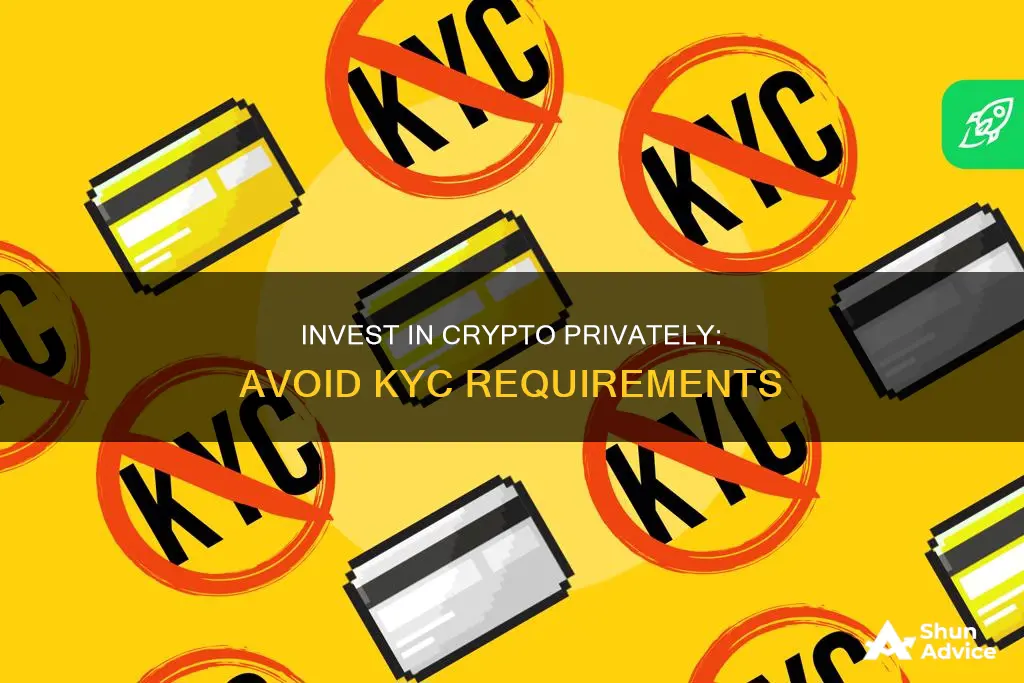
Crypto Know Your Customer (KYC) is a legal requirement for centralized exchanges to verify the identities of their users and prevent money laundering, tax evasion, and illegal financing activities. While some investors value the anonymity of crypto, government agencies are cracking down on non-KYC exchanges, leaving a small and shrinking list of options for those who wish to invest in crypto without KYC. This list includes decentralized exchanges like Uniswap, PancakeSwap, and Bisq, as well as some centralized exchanges like KuCoin, which offer limited services without KYC verification. However, it is important to note that non-KYC exchanges are generally less secure and may have lower liquidity, higher fees, and limited customer support.
| Characteristics | Values |
|---|---|
| No KYC Crypto Exchanges | StealthEX, BYDFi, dYdX, Kraken, MEXC, Changelly, Bybit, TradeOgre, Pionex, CoinEx, RoboSats, Bisq, ProBit, Uniswap, SushiSwap, PancakeSwap, HODL HODL |
| Reasons to Avoid KYC | Privacy Concerns, Lengthy Process, Uncomfortable Sharing Personal Data |
| Pros of No KYC | Privacy, Faster Access, Unrestricted Access, Decentralization |
| Cons of No KYC | Less Secure, Increased Vulnerability to Illicit Activities, Limited Customer Support |
What You'll Learn

Peer-to-peer trading platforms
Peer-to-peer (P2P) trading platforms are a popular way to buy and sell cryptocurrencies without undergoing Know Your Customer (KYC) verification. These platforms facilitate direct transactions between buyers and sellers, without interfering in the deal.
Some of the well-known P2P platforms that do not require KYC are:
- Hodl Hodl: A P2P Bitcoin trading platform that locks Bitcoin in escrow instead of holding customer funds. Hodl Hodl offers a variety of payment options, including bank transfers and in-person payments.
- Bisq: A decentralized, P2P crypto trading platform specifically for Bitcoin. Bisq is available worldwide and allows users to pay for Bitcoin using a variety of methods, including ACH and face-to-face transfers.
- RoboSats: A P2P exchange built specifically for Bitcoin, using the Lightning Network to ensure fast and efficient transactions.
While P2P platforms offer privacy and the ability to transact without revealing one's identity, there are some downsides to consider. P2P platforms generally have lower liquidity, less flexibility in terms of the type of crypto available, and longer transaction execution times. There is also a high risk of being scammed, so it is important to always check a seller's reviews before making contact. In-person cash payments and bank transfers are usually the most reliable payment methods for P2P orders.
Legit Bitcoin Investment Pools: How to Get Started
You may want to see also

Crypto ATMs
There are tens of thousands of crypto ATMs worldwide, with a large portion of them located in the United States. Crypto ATMs are typically located in public shopping centres, gas stations, and airports, similar to traditional banking ATMs.
Most crypto ATMs only offer one-way transactions, meaning that crypto can be purchased but not sold. Some crypto ATMs offer two-way transactions, allowing users to buy and sell crypto in exchange for cash.
Using a crypto ATM requires a mobile phone, a phone number, a picture ID (sometimes), and access to a digital wallet. Here are the common steps to use a crypto ATM:
- Sign up for a digital wallet.
- Find a crypto ATM.
- Verify your identity.
- Scan your wallet.
- Make a purchase.
- Wait for the transaction to complete.
Some crypto ATMs offer a printed voucher to redeem later, while others simply deposit funds into your wallet. It's important to always read the on-screen instructions carefully before making any purchases at a crypto ATM.
Gold Coins IRA: A Smart Investment Move?
You may want to see also

Centralized exchanges (CEX)
Bybit
Bybit is a popular CEX that caters to both verified and unverified users. Unverified users can deposit unlimited amounts of cryptocurrency without providing personal identification documents. However, they are restricted to withdrawing up to 20,000 USDT daily and 100,000 USDT per month. Bybit offers unverified users access to spot trading, margin trading, trading bots, and various derivatives.
KuCoin
KuCoin is a user-friendly CEX with a vast selection of cryptocurrencies available for trading. It offers no-KYC accounts with a withdrawal limit of 1 BTC per 24 hours. KuCoin provides an intuitive mobile app and strong security measures, including multi-layer encryption and two-factor authentication.
Huobi
Huobi is a leading global CEX that offers a range of digital assets for trading. It provides unverified users with a daily withdrawal limit of 0.06 BTC and a deposit limit of up to $1,000/day for certain currencies. Huobi is known for its user-friendly interface and 24/7 customer support.
Poloniex
Poloniex offers Level 1 accounts to no-KYC users, allowing them to access spot and futures trading. Level 1 account holders can withdraw up to $10,000 per day, or $50,000 per day with 2FA enabled. Poloniex also offers 100x leverage for futures trading and hosts exciting competitions with cryptocurrency rewards.
Kraken
Kraken is a highly reputable CEX that offers Starter accounts to users who only provide basic information such as their email, full name, date of birth, phone number, and physical address. Starter accounts have generous withdrawal limits, allowing up to $5,000 in cryptocurrency withdrawals per day and $150,000 per month. Kraken is known for its high security, responsive customer support, and educational resources.
Is Bitcoin a Safe Investment Option?
You may want to see also

Decentralized exchanges (DEX)
Decentralized exchanges (DEXs) are a type of cryptocurrency exchange that operates in a decentralized way, without a central authority. DEXs offer greater privacy than centralized exchanges (CEXs) but have lower liquidity. While CEXs typically require KYC verification, DEXs do not, allowing users to retain control of their funds without providing personal information.
- Uniswap: The largest and one of the most popular DEXs, Uniswap is an automated, fully decentralized token exchange built on the Ethereum blockchain. It enables users to trade Ethereum and ERC-20 tokens quickly and with minimal slippage. It also offers opportunities for earning through liquidity provision.
- PancakeSwap: Built on the Binance Smart Chain, PancakeSwap is the most popular DEX for BNB Chain. It allows users to easily trade BNB and other BEP-20 tokens using a non-custodial wallet. In addition to trading, PancakeSwap offers features such as liquidity provision, farming, staking, and a lottery.
- DYdX: A hybrid decentralized exchange, dYdX offers perpetual trading options for more than 35 cryptocurrencies. It supports various non-custodial wallets, including MetaMask, Trust Wallet, and Coinbase Wallet. dYdX is not available to residents of the US or Canada.
- Bisq: An open-source, peer-to-peer desktop application that allows users to buy and sell cryptocurrencies without holding user funds. Bisq never asks for personal details and uses a secure, peer-to-peer network built on the Tor network for data transfer.
- SimpleSwap: An instant crypto exchange offering more than 900 crypto and fiat currencies for trading. SimpleSwap does not require registration, and users only need to set the terms of their trade and enter wallet addresses to get started.
While DEXs offer the advantage of anonymity, it is important to exercise caution when using these platforms. Always conduct thorough research and check user reviews before depositing any funds.
Cryptocurrency Craze: Americans Invested in Digital Assets
You may want to see also

Crypto mixers
There are two main types of crypto mixers: centralized and decentralized. Centralized mixers are entities that accept your cryptocurrency, mix it with others, and send back a different amount for a fee. While this is a simple process, it presents a privacy challenge as the mixer will have a record of the transactions, which could be revealed in the future. Decentralized mixers, on the other hand, use protocols such as CoinJoin to fully obscure transactions. These mixers allow a large group of users to pool their cryptocurrency and then redistribute it, making it challenging to determine the origin or destination of the funds.
While crypto mixers can provide increased privacy for legitimate users, they are also used by cybercriminals to launder money and obscure the connection between crypto wallets. In some jurisdictions, using mixers to obscure crypto transactions is considered a crime. Therefore, it is important to understand the legal implications in your specific location before using a crypto mixer.
Cronos Coin: Is It a Worthwhile Investment?
You may want to see also
Frequently asked questions
KYC stands for Know Your Customer or Know Your Client. It is a set of guidelines that allow financial institutions to verify a customer's identity and is used to prevent money laundering and terrorism.
Some people believe that KYC infringes on their privacy rights, and are reluctant to hand over personal data due to the risk of it being stolen and sold on the dark web. Others value the anonymity of crypto and wish to hide their credentials from authorities, creditors, or spouses.
Decentralized exchanges (DEXs) are completely anonymous and do not require ID verification. Examples include Uniswap, PancakeSwap, dYdX, Bisq, and Changelly. Some centralized exchanges (CEXs) may also offer limited services without ID verification, such as withdrawals of small amounts. Examples include Kucoin, Pionex, and TradeOgre.







